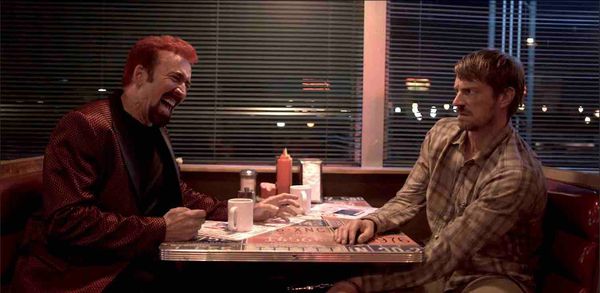Eye For Film >> Movies >> Sympathy For The Devil (1968) Film Review
Sympathy For The Devil
Reviewed by: Chris

In the late Sixties, rebellion against establishment was the order of the day. Paris saw students rioting. They eventually helped to bring down the conservative values of De Gaulle's government. Around the world there were youth protests against the war in Vietnam. In cinema, Godard and the French New Wave sought new forms of expression, new freedoms from the conventional shackles.
At this movie's London opening, Godard was incensed at his producer's unauthorised changes. He suggested that the audience ask for their money back. Donate it to Cleaver's defense fund, he told them. (The Black Panther, Eldridge Cleaver, had just gone underground.) The London audience dissented. Godard called them fascists. A melee ensued. Godard punched the offending producer, who, ironically enough, played a fascist porno bookseller in the film.

Sympathy For The Devil is experimental cinema and agitprop at its finest or most incomprehensible. The main thread is a documentary following the Rolling Stones as they create and record the eponymous song. Then, without warning, the camera cuts back and forth to abstract, fictional scenarios. Quasi-documentary style diatribes. Godard in full-flow polemic.
Many critics at the time derided the movie. It seemed to them to make no sense. Godard, who had become increasingly revolutionary, had lost it, they concluded.
Much of Sympathy For The Devil can, indeed, appear chaotic to casual audiences. The answer is maybe to let it wash over you. The montage, the barrage of ideas, will evoke responses from a diligent and intelligent viewer. But what you make of it may have a lot to do with your own psychological make-up. To join-up-the-dots, here are some snippets I hope may be helpful.
Apart from the Rolling Stones, the other main subjects are these:
A scrapyard. Black revolutionaries. White women wearing only simple white smocks. At one point, the 'Panthers' lay their guns on the women's prone bodies, angled, as if about to fire from a trench.
A rural scene. A woman called Eve Democracy gives yes/no answers to filmmakers. The filmmaker – or Godard - reflects on revolution and the role of culture with his statements – which are offered as questions. "There is only one way to be an intellectual revolutionary and that is to give up being an intellectual." "Orgasm is the only moment when you can't cheat life." "The tragic irony is that in fighting communism we are creating the absolute equivalent of communism in our own society."
A seedy bookshop. A man reads from Mein Kampf. The scene explores fascism, imperialism, art and exploitation.
A graffiti artist sprays compound neologisms/word-games on cars and billboards. 'Cinema' becomes 'Cinemarxism.'
A man is interviewed on black power and Marxism by two young black girls. There is increased action in the junkyard eventually drowning him out. Fighter planes are heard overhead.
Although the scenes are visually arresting, the sound also provokes extreme reactions. Godard uses right wing and left wing propaganda and rhetoric for the dialogue. Many detractors have lost interest over this, accusing him of failing to make coherent arguments. But to my mind, the outpourings of revolution, like the testosterone charge of youth, are never fully formed. They combine brute force with an intellectual striving. For good or ill, they invoke change. Another intercut soundtrack has a prim Englishman reading from a pornographic text.
The film's intertitles use different highlighted letters for tangential meanings. For instance, one section is called 'Outside Black Novel'. Four of the red letters are highlighted with black paint to make the word 'love'. We see a black man sitting in a wheelbarrow. He's on a jetty next to scrap cars and reads out loud from a book (probably by Eldridge Cleaver). He speaks of the blues of the black man, leading us into the idea that black music was exploited by white men. The camera pans into the junkyard (a metaphorical human or technological scrap heap). Black revolutionaries arm themselves and make speeches. The white women prisoners arrive in a red mini van.
The creative process, minutely observed in the recording studio, parallels themes of revolutionary spirit and sexuality. In a dramatic scene, Eve Democracy falls. Her body is borne sacrificially aloft, caught between the red/black flags of communist and anarchist.
To Godard, the dilemmas which the film posed were open-ended. Providing a 'conclusion' would have been against the sense of primal revolution that was the film's core. Which is why he was so incensed that, for commercial reasons, the 'completed' song had been tacked on the end.
Godard's first English movie was originally to be about abortion, but the new abortion law in England spoilt his plans. He then visualised a dialectic between creation (the recording of a song) and destruction (the political climate that leads to uprisings). He would intercut the recording session with a triangular love story about a white revolutionary seduced by a Nazi Texan. She becomes suicidal when her real love embraces the black separatist movement. But Godard decided on the more abstract formula. Still, traces of the original story provide insights into Sympathy For The Devil. Godard's title (his 'Director's Cut') was One + One – which, he pointed out, didn't necessarily mean two.
Although not really a film for any but the most dedicated of Stones fans, Sympathy For The Devil provides intimate insights into their workings as a band. We see Jagger's sober and patient leadership, Brian Jones fairly off his face. The dogged persistence of the band until a good version is achieved. (The film is not critical of the Stones, in spite of the minor 'theft of black music' theme.)
There's an honesty and depth here which is conspicuously absent from the same song performed 40 years later in Scorsese's glossy concert operation, Shine A Light. The guilelessness here is then gone. The 'meaning' of the song, appropriated so beautifully by Godard, probably lost in bright lights and presidential approval.
Sympathy For The Devil is overtly political and not the easiest of Godard's films. But as a shock to a cinema grown fat on saccharine sweetness, it is a breath of intellectual fresh air. I watched it twice straight through.
Reviewed on: 13 Apr 2008

















